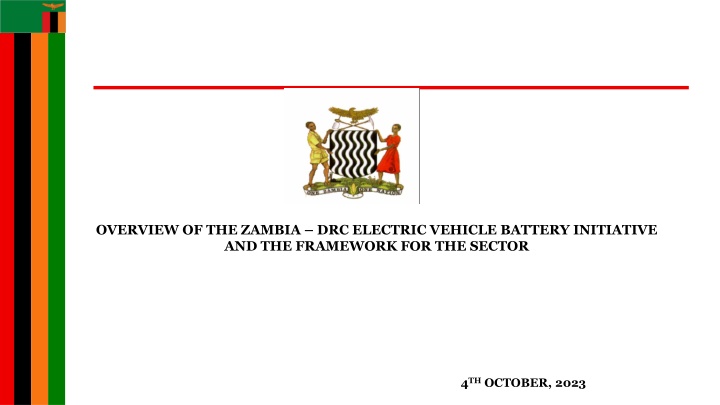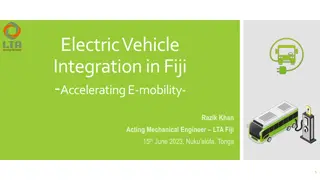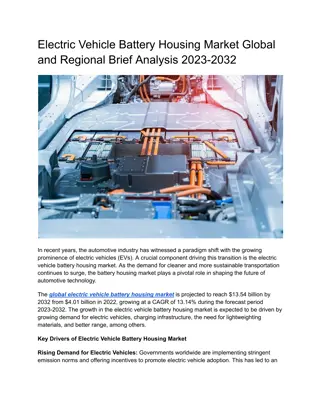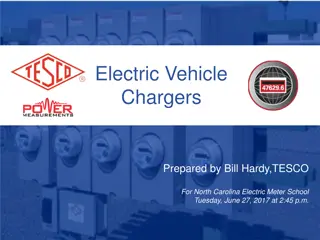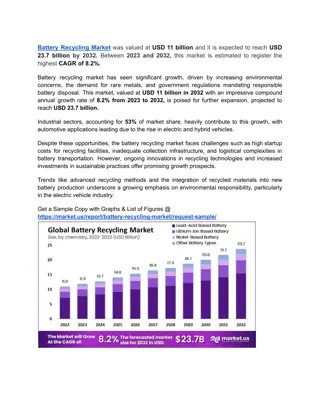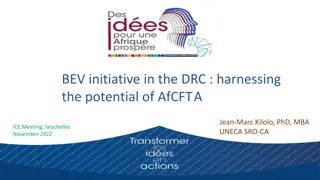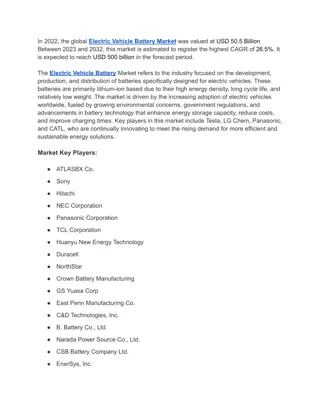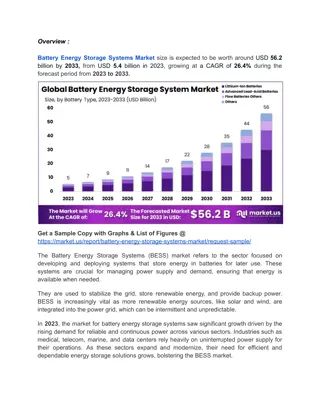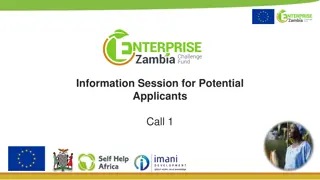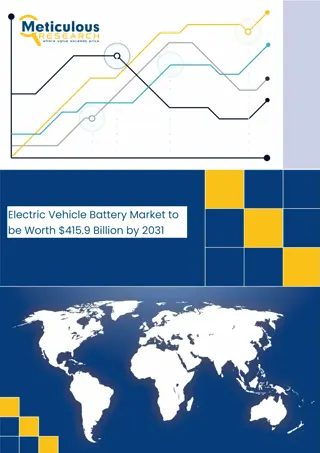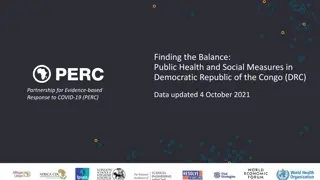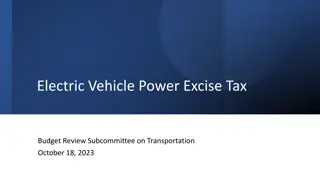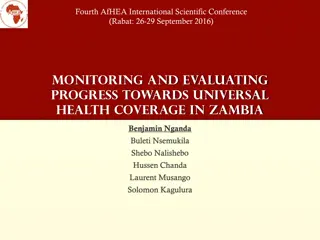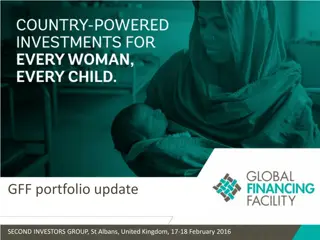Joint Zambia-DRC Electric Vehicle Battery Initiative Overview
The Zambia-DRC Electric Vehicle Battery Initiative aims to leverage Africa's abundant strategic battery minerals to establish a regional value chain for EVs and renewable energy. Supported by key stakeholders, the initiative seeks to drive economic transformation, create jobs, and promote sustainable development in both countries.
Uploaded on Sep 18, 2024 | 16 Views
Download Presentation

Please find below an Image/Link to download the presentation.
The content on the website is provided AS IS for your information and personal use only. It may not be sold, licensed, or shared on other websites without obtaining consent from the author.If you encounter any issues during the download, it is possible that the publisher has removed the file from their server.
You are allowed to download the files provided on this website for personal or commercial use, subject to the condition that they are used lawfully. All files are the property of their respective owners.
The content on the website is provided AS IS for your information and personal use only. It may not be sold, licensed, or shared on other websites without obtaining consent from the author.
E N D
Presentation Transcript
OVERVIEW OF THE ZAMBIA DRC ELECTRIC VEHICLE BATTERY INITIATIVE AND THE FRAMEWORK FOR THE SECTOR 4TH OCTOBER, 2023
OVERVIEW OF PRESENTATION Background Rationale of the EVB Initiative Governance structure of the Initiative Goals of the Initiative Framework for the Initiative Available investment opportunities Areas of Collaboration with the Industry
BACKGROUND OF THE EVB INITIATIVE His Excellency, Mr. Antoine Tshisekedi Tshilombo, President of the Democratic Republic of Congo hosted a multi-stakeholder (DRC Africa) Business Forum from 24th to 25th November, 2021. The aim of the Business Forum was to foster the development of a robust Electric Vehicle Battery (EVB) and Renewable Energy Value Chain and Market in Africa. His Excellency, Mr. Hakainde Hichilema, President of the Republic of Zambia, was invited and attended the Business Forum, where the two Heads of State committed to implementing the Joint EVB initiative between the Republic of Zambia and DRC. Africa Export-Import Bank (Afreximbank) and the United Nations Economic Commission for Africa (UNECA) supported the process and Strategic Partners.
RATIONALE OF THE EVB INITIATIVE The Initiative comes in the wake of global transition dynamics towards a decarbonized world and renewable energy, which require transformational shifts in various aspects related to the sustainable management of natural resources. Africa holds significant reserves of strategic battery minerals such as Cobalt, Lithium, Manganese, Graphite, Nickel, Copper, Phosphorous, Aluminium, and Iron, which could support the emergency of a robust regional value chain for batteries, electric cars, and renewable energy. However, Africa only holds about 3% of the total global value chain of batteries and electric vehicles. In particular, Zambia and the DRC are both well-endowed and produce high-grade of strategic battery minerals, including copper and cobalt, which can be used to fuel economic transformation, in both countries through the global desire for a more green energy driven world economy. The Initiative is expected to support the two economies to derive maximum benefits from the vast mineral resources, through creating value locally and thus stimulating other economic sectors/activities, creating jobs and wealth for its citizens.
GOVERNANCE STRUCTURE OF THE INITIATIVE The Zambia-DRC Battery Council ( BC )is comprised of the Presidents of and DRC, as well as the Deputy Secretary General and Executive Secretary of UNECA and the President of Afreximbank. The Zambia-DRC Battery Council The BC will oversee the implementation of the Zambia-DRC Battery Value Chain Initiative, provide strategic direction for the implementation of the Initiative and provide overall oversight over the work of the Technical Committee amongst other responsibilities. The Technical Committee ( TC )is comprised of senior representatives of the Zambian and DRC governments The Zambia-DRC Technical Committee The TC is in charge of monitoring and evaluation of the Initiative, and will support the Battery Council in ensuring that the outcomes and roadmap agreed upon under the Initiative are implemented. Zambia-DRC EVB Project Development & Implementation Technical Working Groups
GOALS OF THE INITIATIVE 1. Establishment of a local battery industry in Zambia by; i. Attracting investments ii. Fostering local entrepreneurship iii. Creating an ecosystem that supports the production of battery components and complete battery system within the country 2. Job creation and Economic Growth i. Creating employment opportunities along the value chain ii. Driving economic growth through the development of the battery industry that will attract both direct and indirect employment opportunities. 3. Encourage sustainable resource management and promote environmental protection i. Ensuring responsible mining practices ii. Minimising ecological impact of mining activities
GOALS OF THE INITIATIVE Cont. 3. Facilitate technology transfer and knowledge exchange in the battery sector i. Collaborations with international partners, universities, research institutions and industry experts to access cutting edge battery technologies, manufacturing processes and best practices ii. Promote investments in R&D in the sector, locally. 4. Development of infrastructure to support the growth of the electric battery industry by attracting investment in; i. Transportation networks to facilitate movement of raw materials, components and finished batteries ii. Energy generation and distribution iii. Charging infrastructure to support the use of EVs in the country
FRAMEWORK FOR THE INITIATIVE The Cooperation Agreement on the establishment of a Value Chain in Electric Battery and Clean Energy between Zambia and the DRC was signed on 29th April, 2022. The purpose of the Cooperation Agreement is to provide a framework for bilateral cooperation, and to facilitate and strengthen collaboration between the two countries, non-exclusive basis, in areas of common interest necessary for the establishment of Battery Value Chain. Agreement on the establishment of Special Economic Zones dedicated to the Production of Battery Precursors, Batteries and Electric Vehicles signed on 27th March, 2023. The Agreement provided the basis for the commissioning of the Prefeasibility Study for Initiative. on the a the The law that provides for the declaration of the Special Economic Zones in Zambia is the Investment Trade and Business Development Act No. 18 of 2022. Section 7 of the ITBD provides for the declaration of SEZs, these could be Multi-Facility Economic Zones, Industrial Parks, Export Processing Zone, among others. The National Industrial Policy Mineral (metallic and non-metallic) processing and products (Beneficiation), is among the eight priority sectors for Zambia s industrial development
INVESTMENT OPPORTUNITIES AVAILABLE IN THE EVB 1. Investment in mining exploration activities - to expand production capacity, improve extraction techniques and ensure stable supply of raw materials. Funding R&D initiatives, establishing research centres. Research and Development - to drive innovation and technological advancements in battery chemistry, energy storage and recycling techniques. Setting up plants for the production of battery components, assembly lines for complete battery systems. Building or upgrading transportation networks (roads, railways). Develop charging infrastructure and energy grids. Investment in renewable energy generation. Investing in skills development and training programmes (vocational training, technical education, capacity building programmes). Investing in recycling infrastructure and technologies to contribute to a circular economy in the battery industry. 10. Supporting collaborative projects between academia , industry and research institutions 2. 3. 4. 5. 6. 7. 8. 9.
AREAS OF COLLABORATION WITH INDUSTRY 1. Infrastructure Development to support the electric battery value chain: Public Private Partnerships to build efficient transport and energy infrastructure to support the EVB sector 2. Skills Development and Training: Collaboration in knowledge sharing and skills development programmes, including vocational education initiatives, to train the workforce in battery manufacturing, maintenance and recycling Implement exchange programmes, technical training workshops and internships/apprenticeship to develop a competent workforce that meets industry needs 3. Development of Policy and Regulatory Framework(s): Public-Private Dialogue aimed at aligning policies, standards and regulations related to mining practices, mineral beneficiation and product quality. 4. Research and Development, in collaboration with Universities: Setting up a Centre(s) of Excellence (comprising highly-skilled experts) to support the implementation of the initiative
